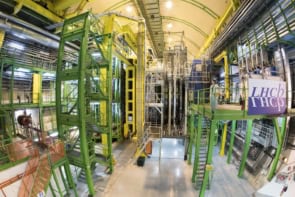A group of 20 Nobel-prize-winning physicists have written to US President George Bush, asking him to work with Congress to find at least $510m in “emergency supplemental funding” for the agencies that pay for much of the nation’s physics research. The laureates sent the letter in response to a similarly-sized shortfall in the amount of money granted by Congress for scientific research in this financial year compared with what Bush had first proposed.
Instead of providing incentives for budding scientists, the funding plan provides discouragement
“[The 2008 budget] sends a terrible message to the next generation of scientists,” the laureates complain in their letter. “Instead of providing incentives for budding scientists, the funding plan provides discouragement”. The letter’s signatories include laser pioneer Charles Townes, particle theorist Frank Wilczek and 2006 winners, the cosmologists George Smoot and John Mather.
The funding situation in the US been difficult this year because the budget for the 2008 fiscal year — which began in October 2007 — was only agreed upon in December 2007, after 11 months of wrangling between the President and Congress. This delay was bad news for those researchers and institutes that had already started spending their 2008 money, only to find that their funding had been cut back or even curtailed.
Two fields financed by the Department of Energy have been particularly badly hit, with funding for high-energy physics falling to $688m — some 12% less than Bush had requested — and support for fusion falling by a third. The cuts led to Fermilab, for example, announcing plans earlier this year to lay-off 200 of the lab’s 1900 staff.
Permanent damage
In the letter, the laureates complain that “hundreds of scientists have been laid off; research grants have been slashed; and facilities operations have been seriously curtailed at national laboratories”, as a result of the shortfall. They also warn that the damage done to American science in 2008 “will become permanent if it is not rectified within the next few months”. This damage, they say, could hamper the nation’s ability to respond to “increased global competition from countries such as China, India, and South Korea”.
Wolfgang Ketterle, who shared the 2001 prize for his work on Bose-Einstein condensates, told physicsworld.com why he signed the letter: “I know from my own experience that scientific progress needs continuity and predictability of funding, both for current research efforts, and for attracting new talent”. He added “the current budget situations does not reflect this”.
The budget cuts have also caused US physicists to limit severely their participation this year in several international projects — including the International Thermonuclear Reactor (ITER), which is being built in France, and the International Linear Collider. “[The 2008 budget] is damaging our reputation as a reliable partner for international projects,” the laureates complain.
Respite in 2009
Bush has already submitted a funding request for 2009, which — if approved — would provide some respite for researchers as it includes significant increases in science spending. In particular, the extra money could allow the US to resume full contributions to ITER and the ILC. In their letter, the laureates “applaud” Bush’s commitment to science but warn that the 2008 funding problems require immediate action. “We strongly urge you to work with Congress in the coming weeks to enact emergency supplemental funding”.
The $510m comprises $310m for the Department of Energy’s Office of Science, $170m for the National Science Foundation and $30m for the National Institute of Standards and Technology.
Kei Koizumi, a budget analyst at the American Association for the Advancement of Science, told physicsworld.com “There is a chance, but a shrinking chance, that 2008 physics funding could be added by Congress this week”. However he cautioned “it’s increasingly likely that everyone will have to wait until 2009 for more physical sciences funding”.



